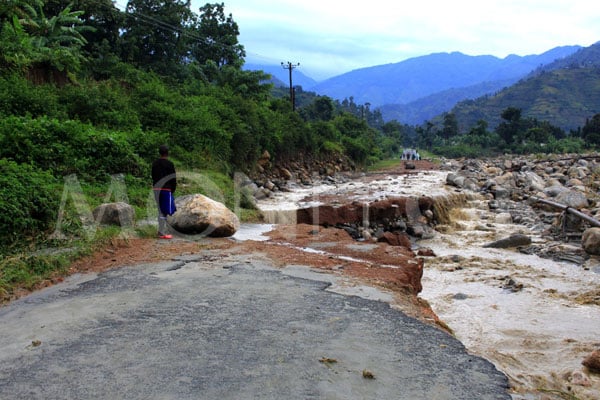Govt moves to shield locals from floods

A section of the road that was damaged by the water from River Nyamwamba in Kasese District on June 22, 2023. PHOTOS/YOWERI KAGUTA.
What you need to know:
A total of 13,904 residents are expected to benefit from the project, which will provide alternative sources of income for the communities and also set up mechanisms to reduce flooding in the area
The government has commissioned a Shs13.4b project aimed at supporting communities around River Nyamwamba who were affected by floods.
A total of 13,904 residents are expected to benefit from the project, which will provide alternative sources of income for the communities and also set up mechanisms to reduce flooding in the area.
The mechanisms include riverbank stabilisation, reafforestation, soil and water conservation enhancement, development of the coffee value chain, stone craft development, fish farming, beekeeping, bamboo planting, fruit tree cultivation, and energy-saving stones, among others.
The project, which is being implemented by the Ministry of Water and Environment, through the Albertine Management Zone and is funded by the World Bank.
During the official commissioning of the project on last Thursday, Dr Emmanuel Brian Guma, the team leader of Albertine Water Management Zone, said all catchment management measures have successfully been implemented.
“This time we shall minimise the impact of floods on River Nyamwamba. In case there is flooding, interventions on the river are many on upstream, middle, and downstream,” he said.
The ministry contracted Mubuku Integrated Farmers Association, the World Wide Fund for Nature (WWF), and the Natural Resources Defence Initiative (NRDI) to implement measures.
For upstream activities, the NRDI implemented restoration activities and improved the livelihoods of the people in 21 villages.
In the upper stream areas, which are prone to soil erosion, soil and water conservation activities covering more than 421 hectares of land were done. This involved setting up trenches, water basins, and planting trees on 500 hectares to mitigate erosion and enhance the overall environmental sustainability of the region.
Last Thursday, three coffee processing factories were commissioned in the upstream area to help communities add value to their coffee.
Additionally, 250 beehives were distributed, more than 400 coffee farmers were trained, and 100 youth received training in stone craft development, among others.
In the midstream, where restoration was undertaken by the World Wide Fund for Nature (WWF), eco-tourism sites were established, bamboo trees were planted, and hundreds of farmers were trained in various enterprises.
Mr Baluku Bobo, the chairperson of the Kibenge Community Tourism Association, said many people in the area were previously dependent on activities near the river, such as sand mining and cultivation along river banks, which have since stopped.
He said more than 200 people living near the river formed a group and engaged in alternative income-generating activities such as fish ponds, beekeeping, arts and crafts, and the establishment of eco-tourism centers which in 2023, yielded Shs56m.
Background
Last week, five people in Kasese District died as a result of floods and mudslides triggered by heavy rain.
The floods also left roads and bridges damaged.
Some of the residents whose houses were destroyed sought shelter at Kibirigha Church.



